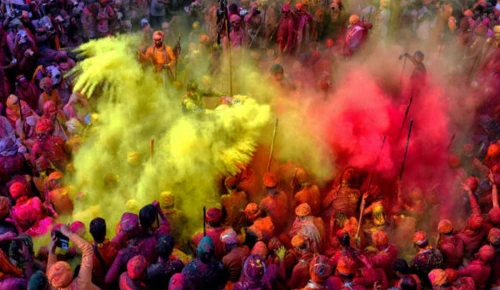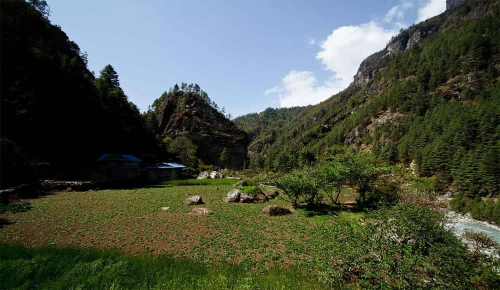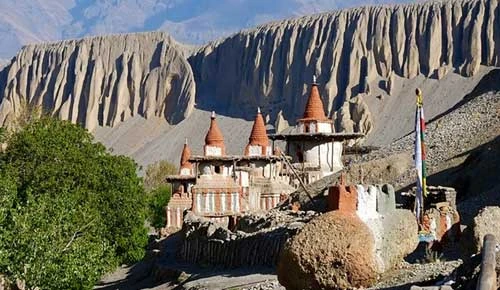Tibetan Festivals: Where Spirituality Meets Splendor
Tibet is renowned for its high-altitude living conditions, yet it is also celebrated for its rich cultural and festive traditions. Festive occasions in Tibet hold great significance as they are times of family reunions. The region boasts unique cultural attire and distinctive festival customs.
The Tibetan population is predominantly devout followers of Buddhism, and this faith's influence permeates throughout Tibet. Spirituality is deeply ingrained in Tibetan culture, making it truly remarkable. Tibetans have a strong inclination towards singing and dancing, fostering strong social connections among themselves.
Tibetan festivals are notable for their multifaceted celebrations, encompassing elements of religion, agriculture, and social recreation. During these festivals, people come together to revel in their shared cultural heritage and history. Visitors also have the opportunity to gain insights into Tibetan Buddhism and the distinct way of life in this high-altitude region.
In the earlier era, before the 1970s and 1980s, Tibet served as a thriving trade hub for people from Nepal and India. The barter system was the prevailing method of conducting trade, involving the exchange of goods with equivalent items. This practice extended to Tibetan festivals, where cultural exchanges with Indian and Nepalese cultures took place. Festivals in Tibet are typically hosted in Buddhist monasteries and sanctuaries.
While the people of Tibet hold deep reverence for Lord Buddha and Guru Padmasambhava, these two influential figures had a profound impact on Tibet by introducing Buddhism to the region.
Table of Contents
Losar ( New Year of Tibet )
Losar is one of the main festivals of Tibet, where Tibetans prepare their houses for Losar, buy new clothing, spend time with friends and family, and clean their dwellings. Along with eating and celebration, traditional dishes like momos (dumplings) and tsampa (roasted barley flour) are served. Many relatives and Pen people used to visit their houses for the celebration. It is done in many different ways, and different youngsters use it as a place of joy and sorrow.

Fact: Losar is also celebrated by Nepalese people most of the Buddhist traditions and cultures of Tibet, Bhutan, India, and Nepal are interconnected with each other. Loshar symbolizes the way of greeting the five elements of this universe: fire, air, water, space, and earth. This shows how they are strongly connected with spirituality. Loshar is celebrated for 15 days, though the main celebration lasts only 3 days. Tibetan people enjoy Loshar by consuming their locally brewed drinks.
Archery and Horse Racing Festivals
Archery and horse racing festivals have always been major pride games in the Himalayas. Tibetans are considered the best horsemen in the world. Horses were one of the major sources of transportation in Tibet before, and archery was also a major sport in Tibet.
Before, archery was used for hunting and self-defense, but later, the people of Tibet accepted it as their festival game. The nomadic peoples of Tibet are much more interested in and capable of this game.

After winning the race or archery, the winner is considered the best man across Tibet.
Winners are offered lots of exciting prizes and gift hampers. It's important to remember that the gifts and awards can be different from one race to the next and may also depend on the cultural and religious importance of the event. In Tibet, horse racing is often more than just a sport. It is also a cultural and community event with long-standing customs.
Buddha Purnima (Buddhist Descent Day )
Buddha Purnima, also known as Buddha Jayanti or Vesak, is a significant Buddhist holiday that commemorates the birth, enlightenment, and death of Siddhartha Gautam, who later became known as Gautam Buddha. It typically falls on a full moon day in April or May, depending on the lunar calendar.

While Tibet does have a Buddhist tradition, the celebration of Buddha Purnima may vary in different regions and among different Tibetan Buddhist communities. Buddha Purnima is celebrated with religious and cultural events in Tibet, especially in places where there are a lot of Tibetan Buddhists. Buddhist people used to visit monasteries by walking on Bhakor Street of Jokhang Temple, chanting mantras, and offering butter on lamps for the praise of Buddha
Shoton Festival (yogurt festival)
The Shoton holiday is a famous traditional Tibetan holiday that is also called the Yogurt Festival. It is held in Lhasa, the capital of Tibet, and other Tibetan places. Based on the Tibetan lunar calendar, the holiday usually takes place at the end of June or the beginning of July.
The Shoton Festival is important for both religion and culture. The word "Shoton" means "yogurt banquet" in Tibetan. The event gets its name from the custom of giving yogurt to monks who have finished their summer meditation vacations.
The Shoton Festival is a lively and happy party that blends Buddhist, cultural, and entertainment aspects. It's a one-of-a-kind chance to learn about the rich traditions and customs of Tibet while taking in the beauty of the Tibetan plains.
Shaga Dawa Festivals
The Saga Dawa holiday, also called Saka Dawa or Saga Dawa Düchen, is an important and holy Tibetan Buddhist holiday that honors the life of Siddhartha Gautam, who later became known as Gautam Buddha. The celebration happens on the 15th day of the fourth month of the Tibetan lunar calendar. In the Gregorian calendar, this is usually in May or June. It remembers the birth, wisdom, and death (parinirvana) of the Buddha, all of which are thought to have happened on the same day.

Saga Dawa is seen as an emotionally powerful time when good works are thought to have a bigger effect. This makes it a good time to do good things and gain credit. It's also a great chance for people from outside the Tibetan Buddhist community to see and learn about their customs, culture, and dedication to kindness and awareness.
Monlam Prayer Festival
The Monlam prayer festival, commonly known as the Great Prayer Festival, has a great impact on Tibetan theist communities. Here, Monlam stands for “aspiration” or “wish”. So, in this festival, many Tibetan monks across Tibet come together at monasteries and pray for world peace and the well-being of all living beings and spread the teachings of Buddha.
The Monlam prayer festival falls under the first lunar month, according to the Tibetan calendar. The festival is celebrated with elaborate ceremonies, including the display of religious antique pieces, mandalas, and the chanting of prayers by monks in respected religious places.
Butter Lamp Festival
In Tibetan Buddhism, the Butter Lamp Festival, which is also referred to as the Butter Candle Festival, is a lively festival that has great meaning on a spiritual level. This yearly celebration normally takes place in the days leading up to or just after the Tibetan New Year, also known as Losar, which takes place in February or March. The lighting of a large number of butter lamps, which stand for the eradication of ignorance and the passing of night, highlights the celebration.

Palden Lhamo Festival
The Palden Lhamo festival is celebrated to remember Palden Lhamo, a glorious goddess and protector of Tibet and the only female goddess of Buddhism. The Palden festival is celebrated at monasteries and temples to ask for blessings and protection from the goddess Palden Lhamo. Overall, this festival has a different aspect; no, it’s a religious event to bring every member of their family together and share a joyous moment with their loved one.
Conclusion
Tibet has been a region of significant political and religious importance, and it has been the subject of various political and religious issues over the years. The two most prominent issues in Tibet are political autonomy and religious freedom. Nepal Trek and Adventure offers you an opportunity to explore the culture and beauty of Tibet. For that, please contact us and view our package for Tibet. We provide various services, giving you a seamless experience in not just exploring Nepal but the worlds around it.








